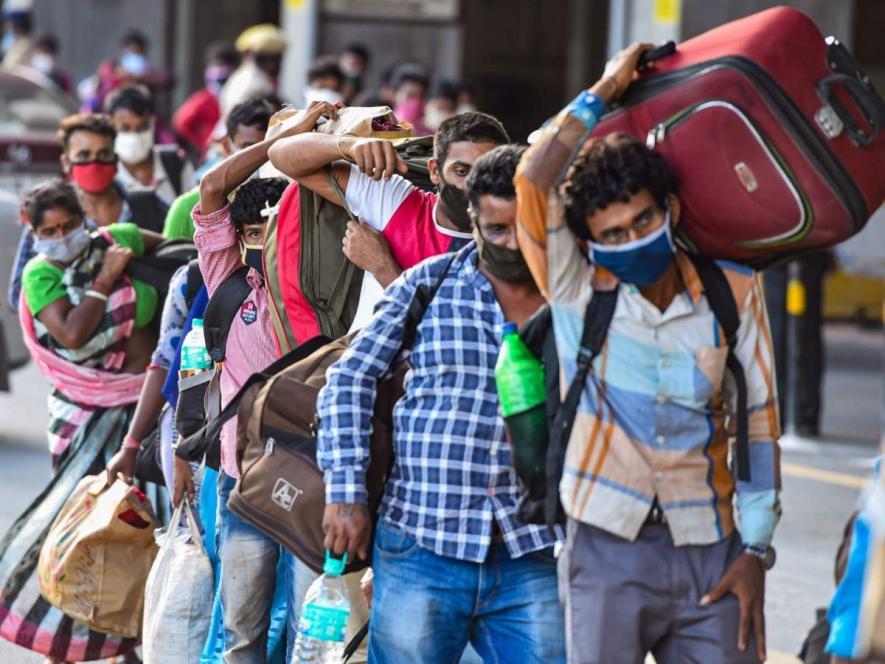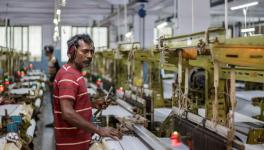COVID-19: Workers Reject PM Modi's Suggestion to Stay Put, Exodus Continues

Representational Image. Image Courtesy: Times of India
The area called Santosh Nagar in Goregoan, Mumbai, houses migrant labourers. They primarily work in nearby real estates sites, are hawkers, auto-rickshaw drivers and skilled workers like plumbers, electricians and so on. The chawls in this area are emptying out once again. Its people are returning to their native places, mainly Uttar Pradesh, Bihar, Jharkhand and Odisha.
"If we stay back now and the situation worsens then rail travel could also be stopped like it happened last year. Then we will have to walk down to our homes again. Better to leave now and come back when everything returns to normal," said Narayan Mondal, a labourer from Jharkhand.
Narayan's reaction is symbolic; everyone here thinks a lockdown will eventually come into place.
Have they not heard Prime Minister Narendra Modi saying a lockdown was the last option?
"Yes, but that also means that there is a possibility of a lockdown in the coming days. Why should we stay behind then?" asked Narayan.
The Maharashtra government has decided to impose stricter restrictions which will come into place from 8 pm on April 22 for fifteen days. The state has decided to cut down on working hours of grocery stores and other essential shops which will remain open only between 7 am to 11 am. Given the backdrop, a number of industries and businesses will curtail functioning.
According to Shashank Rao, who heads various unions in Mumbai, including BEST (Brihanmumbai Electricity Supply and Transport) and the auto union, believes that almost 60% of auto-rickshaws will have no work in the near future. "As people are not going out, the demand for autos and taxis has gone down. Our auto drivers have parked their vehicles as they don't have work. What will they do sitting at home? It's not easy to survive in a city like Mumbai without work," he said.
Jubeda Momin Pathan was packing her things when Newsclick reached Malad's Malwani area. She, her husband and two children have confirmed train tickets to Saran in Bihar. Pathan runs a small shop in her tiny room and her husband Momin works as an electrician in a private showroom in Malad. As the shop he works in is closed and will not be open till at least May 6, the family has decided to go back to home.
"We stay in a small place. There is fear of corona. People are not able to get a bed in hospitals. So, it is better to go back at home and stay there," she said. With workers witness to infected people failing to avail proper treatment and with businesses closing down temporarily, they are being forced to return to their villages again, a year later.
With the labourers returning home, small-scale industries are being affected. Newsclick spoke to some small-scale manufacturers in Dharavi, Mumbai, and those from Ulhasnagar in Thane.
Shivcharan Dubey owns a jeans manufacturing facility in Dharavi which employed ten workers. His business was shut for almost six months in 2020 and he got it going again somehow in November later that year. However, as the novel coronavirus distressingly affects Mumbai again, the labourers in Dharavi have started deserting the area. Out of ten, six have already returned to their villages with the rest also planning on moving.
"I won't be able to tell them to stay back. How can I? Our work has stopped; they won't get money. Also, living here is much riskier. So, everybody is now going home again," said Shivcharan. The government has allowed industries to run with strict norms in place. While that may work for the bigger players, those like Shivcharan, who run small businesses in crowded areas like Dharavi and Bhiwandi have no other option but to shut them down.
The situation is no different in Ulhasnagar. This city has more than a thousand small-scale furniture manufacturing units and about 1,500 which make garments. But as labourers are leaving the town, these units are shutting down.
Karan Motchandani is a young entrepreneur with three garment units in the city. He employs 25 persons. One of his units is closed down due to a number of issues, one being that labourers are not available.
"I don't know whether the rest of the units will continue to run or not. We are taking all precautions. But look at the COVID numbers. The number of patients is increasing everywhere. We can't ask labourers to come to work," he said. "Why just labourers? All of us are scared," he added.
The fear of COVID-19 and the reality of a crumbling healthcare system are not just scaring labourers. It is resulting in another large-scale exodus from all industrial cities and townships. The country thought it had seen it all in 2020. The next year is proving to be even worse.
Get the latest reports & analysis with people's perspective on Protests, movements & deep analytical videos, discussions of the current affairs in your Telegram app. Subscribe to NewsClick's Telegram channel & get Real-Time updates on stories, as they get published on our website.
























